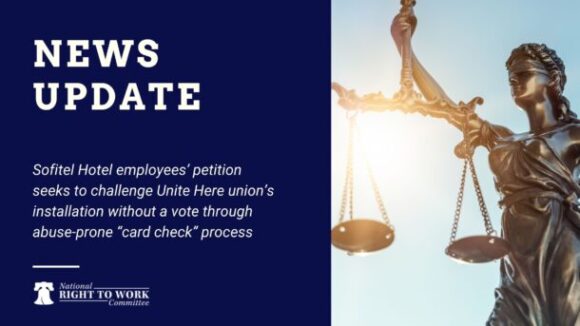Foundation Fires Back Against Biden NLRB ‘Card Check’ Mandate
Brief challenges Labor Board’s attempt to expand coercive, anti-employee organizing scheme
 Sen. Marco Rubio writes on the pages of National Review about the RAISE Act, legislation that would permit an employer to award individual employees with financial incentives beyond the pay or compensation level specified in a collective bargaining agreement (CBA):
Sen. Marco Rubio writes on the pages of National Review about the RAISE Act, legislation that would permit an employer to award individual employees with financial incentives beyond the pay or compensation level specified in a collective bargaining agreement (CBA):
The basis of the American Dream is that one can work hard, play by the rules, and realize one’s potential. But big-government policies deny this freedom to millions of Americans. One of these policies can be fixed when the Senate votes on the RAISE Act later today.
Under federal law, private-sector union contracts do not just set the minimum wage employers pay, they also set the maximum wage. Businesses may not pay more than the union rate without negotiating it.
Unfortunately, unions often say “No” when employers propose rewarding productive workers. Unions prefer contracts that, to quote Teamsters president Jimmy Hoffa, “create uniform standards for all employees” — no matter how hard they work. Only about one in five union contracts permit performance pay.
If unionized companies go ahead and pay productive workers higher wages, the National Labor Relations Board (NLRB) will strike them down. This precedent goes back decades. In NLRB vs. C & C Plywood Corp. (1967), a business had agreed to pay up to $17 an hour (in today’s dollars). The company announced, over union objections, that everyone would get $18.50 an hour if they met productivity goals. The NLRB ordered the company to stop paying the raises, and the Supreme Court upheld the decision. In sum, companies were forbidden from paying more than the union rate without the union’s permission.
Even small individual bonuses are illegal. The Brooklyn Hospital Center in New York gave its best nurses $100 gift cards as a token of appreciation. The NLRB ordered the hospital to cease and desist.
This system is unfair to workers and out of step with the modern workplace. Employers should be able to use merit-based pay to motivate their employees. Workers want and deserve to be rewarded for their achievements. Even countries with strong union movements, like the United Kingdom, allow union members to negotiate higher wages.
For this reason, I introduced the Rewarding Achievement and Incentivizing Successful Employees (RAISE) Act. The RAISE Act allows unionized employers to pay workers higher wages than the union rate. Discriminating against union members would remain illegal, as would pay increases unconnected to performance on the job, such as sex discrimination. However, companies would always be free to pay higher wages to hard-working employees.
This would mean both higher wages and higher profits. The Heritage Foundation reports that workers’ pay rises 6–10 percent under performance-based pay systems. For a private-sector union member, that could mean a raise of between $2,700 and $4,500 a year. Companies pay these raises because harder work raises productivity and makes the company more profitable.
Performance pay encourages labor and management to work together to bake a larger economic pie so everyone can enjoy a bigger slice. The RAISE Act would expand opportunity for millions of Americans — including the 2.8 million women covered by union contracts in the private sector.
Brief challenges Labor Board’s attempt to expand coercive, anti-employee organizing scheme

Josh Hawley distances himself from pro-Right to Work pledges, aligning with union bosses like the Teamsters, despite their history of corruption.

Sofitel Hotel employees’ petition seeks to challenge Unite Here union’s installation without a vote through abuse-prone “card check” process